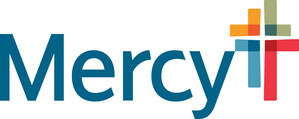Program attracts and retains highly experienced nurses for the best patient care
SPRINGFIELD, Mo., May 9, 2022 /PRNewswire/ -- When COVID-19 cases spiked, so did the rate of pay for travel nurses who were willing to temporarily move to an unfamiliar city to provide care. That attracted some caregivers away from local hospital bedsides for opportunities in less-familiar places that could pay more.
"I believe I had romanticized travel nursing," said Ruth Norton, who recently left her full-time position at Mercy Hospital Springfield to take a nursing travel agency contract in Columbia, Missouri. "I thought I would see new places, make new friends and learn so much more. The reality is that you're working in a stressful, unfamiliar environment and living in a place that's not your home. It's difficult to make friends, and you're often by yourself. The single best thing about travel nursing is that you are paid well."
Beyond the lure of travel nursing, the pandemic also took a toll on nurses' physical and mental well-being. Some retired early or stepped away from the bedside, adding to what was already a nationwide nursing shortage. WATCH HERE.
For Mercy, it was a signal that nurses needed options for a better way of working.
"Nurses are telling us what they want and need, and we are doing something about it," said Betty Jo Rocchio, senior vice president and chief nursing officer across the Mercy system. "They want flexibility, a schedule that lets them meet their personal obligations and a work setting that matches their skills and interests. And that isn't just for nurses who are traveling – it's also the desire of those who have opted to continue full or part-time roles in their home communities. We wanted to meet the needs of every nurse – those who want a different way of working and those who want the familiar routine that comes with serving in their hometown hospital or clinic. By providing everyone with new options, we knew we could attract the very best caregivers for our patients."
To test the idea, Mercy's nursing team launched a pilot program at Mercy Hospital Springfield in Missouri. It centers around an app and online platform called "Mercy Works on Demand," where Mercy's full and part-time co-workers can easily pick up extra shifts. For the first time, the new platform also opened shifts to other experienced nurses in the area – school nurses, those who work for other health care employers and nurses like Norton, who had left to travel. The on-demand platform was designed as a one-stop solution for highly qualified nurses who want to be part of Mercy, even if for just a few hours a week.
"I come back home to Springfield when I have four to five days off," Norton said. "When I'm here, I pick up an extra 'gig' shift at my home base. It's a perfect way to keep my connections at Mercy."
For Madysen Feeney, the new gig shifts enable her to stay home with her infant daughter, keep her nursing skills sharp and still pull in a paycheck. "It's been life-changing," she said. "I feel like I'm living, not just surviving."
After her daughter's birth, Feeney returned to work at Mercy Hospital Lebanon as a night shift nursing supervisor. The hours and lack of sleep caught up to her quickly, and when her husband was able to get the family health insurance through his work, Feeney planned to stay home. "Financially, we could've done it," she said. "But we would've had to be diligent about our budget. With this new program, I'm able to work one night in Lebanon, and supplement that income with a shift the next week in the emergency room in Springfield."
Working one 12-hour night shift a week means Feeney doesn't have to put her daughter in daycare, and there is another advantage she hadn't anticipated. "It's been great to go back to the bedside in the ER," she said. "I didn't realize how much I missed caring for patients."
While the hourly rate for Mercy's gig nurses includes incentives for shifts that are difficult to fill, Rocchio stresses the advantages of being a full-time or even regularly scheduled part-time Mercy nurse. "Nurses who opt for these gig positions can't work more than 30 hours per week. They aren't guaranteed shifts, they don't earn paid time off, and they don't qualify for health insurance or other benefits like our new dependent care contribution. What they do get is the opportunity to pick shifts when they want, for as few as four hours at a time."
During its pilot phase in Springfield, more than 50 nurses signed on to a gig role. The extra help, combined with the new scheduling tool, freed managers to focus on helping the nurses in their units instead of worrying about staffing. "I used to spend so much time calling our nurses during their free time and asking them to pick up shifts so I could get the schedule filled," said Karla VanHorn, nurse manager at Mercy Hospital Springfield. "Once the pilot started, we could all easily see the schedule and the open shifts. Our core nurses would pick them up, or gig nurses would. I no longer constantly look at the schedule, and when our nurses come in, they aren't concerned about being short staffed, either. Even better – I'm no longer bothering them when they're off, asking them to work."
Gig nursing shifts have opened in Springfield, Joplin, Lebanon and the surrounding areas for experienced registered nurses and licensed practical nurses. The positions are listed at https://bit.ly/MercyGIGNurse.
"Our pilot in Springfield was so successful, we're opening it up more widely," Rocchio said. "We plan to roll it out across Mercy. For nurses, this will be our new way of working at Mercy. We're going to respond to their needs by offering schedules they want and getting more help to lighten their load. The COVID-19 pandemic put unprecedented stresses on our health care workers. We wanted to innovate a new workforce solution to ensure we care for our nurses like they care for our communities."
SOURCE Mercy

WANT YOUR COMPANY'S NEWS FEATURED ON PRNEWSWIRE.COM?
Newsrooms &
Influencers
Digital Media
Outlets
Journalists
Opted In





Share this article